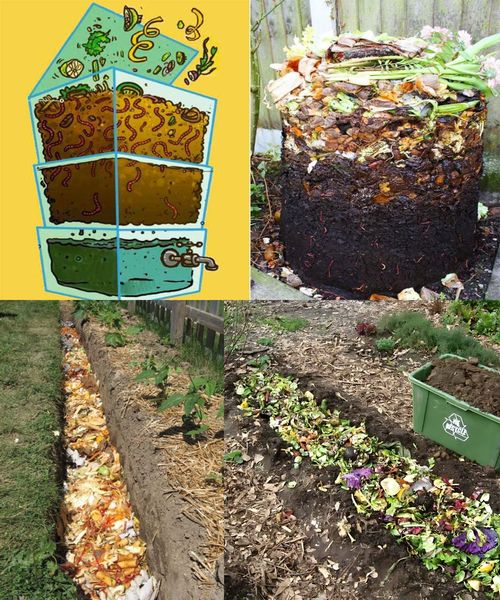The Ultimate Guide to Composting: Turning Waste into Garden Gold
Composting is an ancient practice that has been rediscovered and appreciated today as an efficient and sustainable way of managing organic waste. It consists of a natural process of controlled decomposition of organic materials, such as food scraps, leaves, grass clippings and other biodegradable waste, to produce a rich fertilizer known as compost.
This compost, often called “black gold” because of its value to the soil, is an invaluable nutrient for the garden and helps maintain a healthy life cycle in the ecosystem.
Getting started with composting: materials and maintenance
The composting process is simple and requires little more than the right materials and a little regular care. Here is a step-by-step guide to get you started:
1. Compost bin:
To get started, you’ll need a compost bin. You can opt for a tumble composter, a compost pile on the ground, or even build your own bin out of recycled materials. The important thing is that the bin allows for proper ventilation and retains the moisture needed for the decomposition process.
2. Materials for composting:
Composting relies on the right mix of green and brown materials. Green materials include kitchen scraps like fruit and vegetable peelings, fresh grass clippings, and green plants. Brown materials are things like dried leaves, twigs, paper, and cardboard. The ideal ratio is about three parts brown materials to one part green materials.
3. Compost maintenance:
To ensure an efficient composting process, it is important to maintain a balance between moisture and aeration in your compost pile. Make sure to regularly turn the materials to facilitate decomposition and prevent unpleasant odors. Also, add water occasionally to maintain proper moisture, but avoid the compost becoming too wet.
4. Decomposition time:
The length of time it takes to compost can vary depending on a number of factors, including ambient temperature, humidity, and the materials used. In general, you can expect compost to be ready for use in the garden in about three to six months. You’ll know it’s ready when it has a fresh earthy smell and a dark, fluffy texture.
We recommend: What time is best to water plants and other gardening tips for beginners
Benefits of composting for your garden
Composting offers a number of benefits for both your garden and the environment at large:
1. Improves soil quality: Compost is a nutrient-rich organic fertilizer that improves soil structure, increases its water retention capacity and promotes beneficial microbial activity.
2. Reduces the need for chemical fertilizers: By providing natural nutrients to the soil, composting reduces the dependence on chemical fertilizers, which in turn helps protect the environment from pollution.
3. Reduces waste sent to landfills: Composting diverts organic waste from landfills, where it can emit harmful greenhouse gases when it decomposes anaerobically.
4. Promotes biodiversity: By improving soil health, composting creates an environment conducive to microbial and macrobial life, thus promoting biodiversity in your garden.
In short, composting is an essential practice for any environmentally conscious gardener. Not only does it help reduce waste and improve soil quality, but it also contributes to the health and beauty of your garden. So join the composting movement and turn your waste into gold for your garden.
